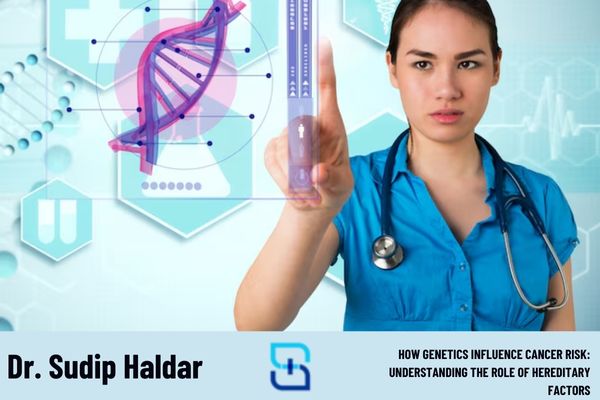How Genetics Influence Cancer Risk: Understanding the Role of Hereditary Factors with Dr. Sudip Haldar
Cancer is often seen as a disease influenced by lifestyle and environmental factors, but genetics also play a significant role in determining an individual’s risk. Certain gene mutations passed down through families can increase susceptibility to specific types of cancer. In this blog, Dr. Sudip Haldar, a renowned expert in oncology, explains how hereditary factors influence cancer risk and what steps individuals can take for early detection and prevention.
1. Understanding Hereditary Cancer Risk
Hereditary cancer occurs when a genetic mutation is inherited from one or both parents. These mutations are present in every cell of the body and can increase the likelihood of cancer developing at an earlier age or in multiple organs.
Common Hereditary Cancer Syndromes:
- BRCA1 and BRCA2 Mutations: Linked to breast, ovarian, and prostate cancers.
- Lynch Syndrome: Associated with colorectal, endometrial, and stomach cancers.
- Li-Fraumeni Syndrome: Increases the risk of several cancers, including breast cancer and sarcoma.
Dr. Haldar explains that 5-10% of all cancers are caused by inherited genetic mutations, making awareness and early intervention essential.
2. How Do Genetic Mutations Cause Cancer?
Genes control how cells grow, divide, and repair damage. Mutations in specific genes, such as tumor suppressor genes (e.g., BRCA1, BRCA2, TP53), disrupt this balance, allowing abnormal cells to grow uncontrollably and form tumors.
- Tumor Suppressor Genes: Prevent cells from growing too quickly.
- Oncogenes: Control normal cell growth but can cause cancer when mutated.
- DNA Repair Genes: Correct damage in the cell’s genetic material; mutations can lead to further damage accumulation.
Dr. Haldar emphasizes that not all mutations cause cancer, but certain inherited mutations significantly increase risk.
3. Identifying Your Genetic Risk
Early identification of hereditary cancer risk is crucial for prevention and management. Genetic testing and counseling are valuable tools in assessing an individual’s predisposition to cancer.
Who Should Consider Genetic Testing?
- A strong family history of cancer, especially at a young age.
- Multiple relatives with the same or related types of cancer.
- Individuals diagnosed with cancer at an unusually early age.
- Certain ethnic groups (e.g., Ashkenazi Jewish descent for BRCA mutations).
Dr. Haldar advises individuals with a family history of cancer to consult with a genetic counselor or oncologist for a thorough risk assessment.
4. Preventive Strategies for Hereditary Cancer
While genetic predisposition cannot be changed, proactive measures can reduce cancer risk or enable early detection:
A. Regular Screenings and Checkups
- Early screenings (e.g., mammograms, colonoscopies) help detect cancer before symptoms arise.
- High-risk individuals may require more frequent or specialized screenings.
B. Preventive Surgeries
- Prophylactic mastectomy (removal of breasts) for BRCA mutation carriers.
- Hysterectomy (removal of the uterus) for those at risk of endometrial cancer.
C. Lifestyle Modifications
- Maintain a healthy diet and regular exercise routine.
- Avoid tobacco and limit alcohol consumption.
- Manage stress and prioritize mental health.
Dr. Haldar underscores that knowledge is power, and these preventive steps can dramatically reduce cancer risks.
5. The Role of Genetic Counseling
Genetic counseling is a critical part of managing hereditary cancer risk. Genetic counselors and oncologists:
- Explain the implications of genetic testing results.
- Guide individuals in making informed decisions about screening and preventive treatments.
- Provide emotional support and resources for patients and families.
Dr. Haldar recommends that families with hereditary cancer syndromes seek regular counseling sessions to stay informed and proactive.
6. Advancements in Genetic Research and Cancer Treatments
Modern oncology has seen groundbreaking advancements in understanding and managing hereditary cancers:
- Targeted Therapies: Drugs designed to target cancer-causing mutations directly.
- Immunotherapy: Boosting the body’s immune response to fight cancer cells.
- Precision Medicine: Treatments tailored to an individual’s genetic profile.
Dr. Haldar believes that continued research in genetic oncology holds the key to more effective, personalized cancer treatments in the future.
7. Final Thoughts from Dr. Sudip Haldar
“Understanding your genetic risk for cancer is not about fear—it’s about empowerment and taking control of your health. With genetic testing, preventive measures, and personalized care, we can significantly reduce cancer risks and improve outcomes.”
Dr. Haldar encourages everyone with a family history of cancer to take the first step: consult a specialist, get tested if necessary, and adopt preventive measures to stay one step ahead.
Take Control of Your Health Today
If you or a loved one is concerned about hereditary cancer risk, schedule a consultation with Dr. Sudip Haldar. Together, you can create a personalized plan for prevention, early detection, and treatment.
Stay informed. Stay proactive. Stay healthy.

